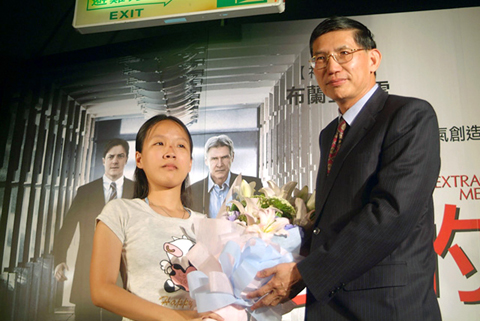The movie Extraordinary Measures tells the story of parents who formed a biotechnology company to develop a drug that could save the lives of children who have the rare life-threatening disease known as Pompe.
In the movie, which is based on the book The Cure, Harrison Ford plays research scientist Robert Stonehill, who was instrumental in finding the cure, while Brendan Fraser plays John Crowley, the man who raised US$100 million to buck the medical establishment.
In reality, John Crowley is the name of the person who started the biomedical company, but the real Dr Stonehill who developed the cure is in fact Chen Yuan-tsong (陳垣崇), director of Academia Sinica’s Institute of Biomedical Sciences.

PHOTO: CNA
At an event held earlier this week by the Taiwan Foundation for Rare Disorders to mark the debut in Taiwan of the movie’s DVD, Chen said he had mixed feelings watching the movie.
He said he began researching a cure for Pompe disease in 1991 after being saddened by the deaths of so many children from the affliction.
“Before I knew it, it had been 15 years,” he said. “It also surprised me that Hollywood would have made a motion picture out of it, making it the second movie about rare diseases and patients after Lorenzo’s Oil.”
Movie critic Roger Ebert said that Harrison Ford, as the film’s executive producer, probably saw Stonehill as a good role for himself and ordered a rewrite of the script because he could not play Chen.
Regardless of how Hollywood decided to recast Chen, his contribution to helping find the cure is well established.
He developed the treatment with colleagues at the Duke University Medical Center. His research and development was mostly done in the US, but Chen conducted his clinical trials for the cure — later named Myozyme — at National Taiwan University Hospital.
Myozyme, which took Chen and his team 15 years to research and develop, was introduced in Taiwan by US pharmaceutical company Genzyme and has been covered by the National Health Insurance (NHI) program since 2005, the foundation said.
Myozyme was sold in Europe and the US after it was approved by the US Food and Drug Administration and the EU health authority in 2006. It has contributed to saving the lives of more than 1,000 patients with Pompe disease, or acid maltase deficiency, worldwide each year, including 34 in Taiwan.
Young Pompe disease sufferers have symptoms similar to muscular dystrophy, the foundation said.
Without a cure, most children with Pompe disease die before they reach two years old. There is also a juvenile and adult form of the disease, which can appear at almost any age, the foundation said.
Currently, Pompe disease patients in Taiwan receive NT$7.9 million (US$245,577) per patient per year in Myozyme and related medical care under the NHI program, greatly reducing their families’ financial burden, the foundation said.
The foundation quoted tallies from the Cabinet-level Department of Health as indicating that there are nearly 6,000 families with rare disease patients in Taiwan, but more than 70 percent of them do not receive effective drugs or therapies, the foundation said.

An essay competition jointly organized by a local writing society and a publisher affiliated with the Chinese Communist Party (CCP) might have contravened the Act Governing Relations Between the People of the Taiwan Area and the Mainland Area (臺灣地區與大陸地區人民關係條例), the Mainland Affairs Council (MAC) said on Thursday. “In this case, the partner organization is clearly an agency under the CCP’s Fujian Provincial Committee,” MAC Deputy Minister and spokesperson Liang Wen-chieh (梁文傑) said at a news briefing in Taipei. “It also involves bringing Taiwanese students to China with all-expenses-paid arrangements to attend award ceremonies and camps,” Liang said. Those two “characteristics” are typically sufficient

A magnitude 5.9 earthquake that struck about 33km off the coast of Hualien City was the "main shock" in a series of quakes in the area, with aftershocks expected over the next three days, the Central Weather Administration (CWA) said yesterday. Prior to the magnitude 5.9 quake shaking most of Taiwan at 6:53pm yesterday, six other earthquakes stronger than a magnitude of 4, starting with a magnitude 5.5 quake at 6:09pm, occurred in the area. CWA Seismological Center Director Wu Chien-fu (吳健富) confirmed that the quakes were all part of the same series and that the magnitude 5.5 temblor was

The brilliant blue waters, thick foliage and bucolic atmosphere on this seemingly idyllic archipelago deep in the Pacific Ocean belie the key role it now plays in a titanic geopolitical struggle. Palau is again on the front line as China, and the US and its allies prepare their forces in an intensifying contest for control over the Asia-Pacific region. The democratic nation of just 17,000 people hosts US-controlled airstrips and soon-to-be-completed radar installations that the US military describes as “critical” to monitoring vast swathes of water and airspace. It is also a key piece of the second island chain, a string of

The Central Weather Administration has issued a heat alert for southeastern Taiwan, warning of temperatures as high as 36°C today, while alerting some coastal areas of strong winds later in the day. Kaohsiung’s Neimen District (內門) and Pingtung County’s Neipu Township (內埔) are under an orange heat alert, which warns of temperatures as high as 36°C for three consecutive days, the CWA said, citing southwest winds. The heat would also extend to Tainan’s Nansi (楠西) and Yujing (玉井) districts, as well as Pingtung’s Gaoshu (高樹), Yanpu (鹽埔) and Majia (瑪家) townships, it said, forecasting highs of up to 36°C in those areas